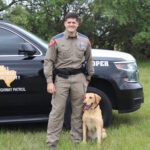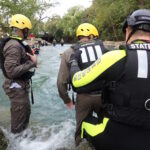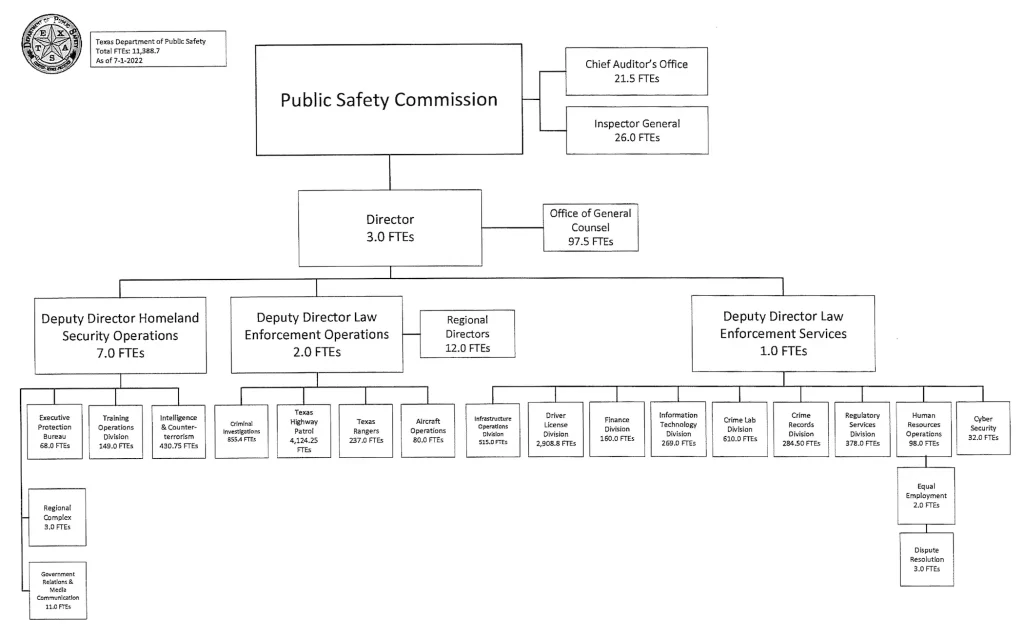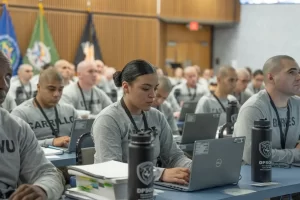The Texas Department of Public Safety (DPS) is the statewide law enforcement and public safety agency for Texas. Best known for its Highway Patrol and Texas Rangers, DPS handles a broad range of duties including traffic enforcement, criminal investigations, organized crime and cartel activity, fugitive apprehension, and mass casualty response.
Although Texas does not use the term officially, DPS troopers function as the state’s de facto state police, with authority that extends across all counties.
Working alongside local and federal law enforcement agencies, DPS is a critical part of Texas’ overall law enforcement system. It supports local agencies with specialized resources such as crime labs, intelligence units, and aviation assets. The department also administers driver licensing, criminal records, and regulatory programs affecting firearms, private security, and vehicle inspections.
With more than 10,000 employees and facilities spread across Texas—including regional headquarters, crime labs, and driver license offices—DPS maintains a physical presence in nearly every corner of the state. This reach allows it to respond quickly to emergencies, assist local law enforcement, and provide public services in both urban and rural communities.






Functions
DPS employs hundreds of specialists, such as forensic analysts, cyber investigators, and surveillance experts, who help local, federal, and state law enforcement handle serious criminal cases and emergency situations, including:
- Hostage Negotiations
- Serial Murder Investigations
- Gang and Cartel Investigations
- Arson, Bomb, and Sniper Cases
- Mass Shootings
- Drug Trafficking and Human Trafficking
- Air and Boat Patrol and Rescue Operations.
The department also provides services for the general public, including issuing drivers licenses and maintaining a publicly accessible database of criminal records.
Structure
The Texas Department of Public Safety is composed of more than a dozen divisions, including the Texas Rangers, Highway Patrol, Intelligence and Counterterrorism, Training Operations, Aviation Operations, Crime Laboratories, and Criminal Records.
These divisions are grouped into three categories — Homeland Security Operations, Law Enforcement Operations, and Law Enforcement Services — each of which is headed by a deputy director with the rank of lieutenant colonel.

The department as a whole is headed by a director with the rank of colonel.
Additionally, the department has regional directors responsible for commanding DPS operations within particular parts of the state. Six regional commands are headquartered in Garland (near Dallas), Houston, Weslaco (near McAllen), El Paso, Lubbock, and San Antonio.
The seventh regional command, Capitol Complex Region 7, is charged with securing the State Capitol, Governor’s Mansion, and other state buildings in a 46-block area of Austin. However, the Capitol Command isn’t responsible for Austin as a whole, which falls within Region 6 headquartered in San Antonio. Department personnel assigned to Region 7 provide security to the governor, lieutenant governor, speaker, and other officials as necessary.
DPS’s most storied divisions is the Texas Rangers, which is featured in many films and novels and has origins dating back to the early 19th century. Now functioning as an elite investigative unit within DPS, the Rangers handle complex criminal investigations, officer-involved shootings, public corruption cases, and unsolved homicides. The Rangers work closely with district attorneys, sheriffs, and federal agencies, often providing expertise and oversight in politically sensitive cases.
Governance and Oversight
A five-member Public Safety Commission serves as the policy-making body for the department. Its members are appointed by the governor and confirmed by the Texas Senate. They serve without pay for staggered six-year terms.
The commission appoints the DPS director and consents to appointments of deputy directors and assistant directors. The governor may assume command of the department during a “public disaster, riot, insurrection, or formation of a dangerous resistance to enforcement of law.”1
Jurisdiction and Legal Authority
The legal framework for the Texas Department of Public Safety is established in Texas Government Code Chapter 411, which defines the department’s mission, powers, and internal structure. As a statewide law enforcement agency, DPS has authority that extends across all 254 counties, making it distinct from municipal police departments and county sheriff’s offices.
While most law enforcement entities are confined to local jurisdictions, DPS officers have arrest authority anywhere in the state and may be deployed to support border security, natural disaster response, or major investigations on short notice. This broad jurisdiction allows the agency to play a coordinating role in Texas’s decentralized public safety system.
Recruitment and Training
Troopers and special agents undergo rigorous training at the DPS Law Enforcement Academy in Florence, Texas. In addition to physical conditioning, cadets receive over 1,200 hours of instruction in criminal law, constitutional rights, defensive tactics, firearms, and crisis de-escalation techniques.

Graduates often pursue specialized training in fields such as forensic investigation, aviation, cybercrime, or tactical operations. DPS also offers in-service training for seasoned officers and joint programs with local departments to raise professional standards statewide.
Relationship to Local Law Enforcement
Texas DPS provides a variety of services to local law enforcement agencies, which generally don’t have resources to hire specialists, operate crime labs, or conduct specialized trainings. About 50% of the state’s law enforcement agencies have ten or fewer officers.
DPS provides the following services to local law enforcement:
- operating crime laboratories;
- maintaining a searchable criminal history database;
- maintaining a searchable sex offender registry;
- maintaining an index of gang intelligence information;
- maintaining a combined DNA index system;
- providing access to national crime databases;
- providing an automated fingerprint identification system; and
- grants and federal grant application assistance.
DPS’s Crime Laboratory Division employs approximately 600 personnel.
Driver Licenses and Other Services
In addition to its law enforcement role, the Texas Department of Public Safety administers the following programs:
- issuance of Driver Licenses and IDs;
- handgun licensing;
- issuance of licenses for motor vehicle inspectors;
- issuance of licenses for metal recycling businesses; and
- issuance of licenses for private security.
- Texas Government Code sec. 411.012 ↩︎



